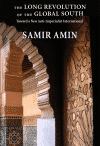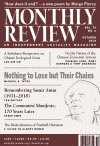
The United Fruit Co.
This poem was published in volume 18, number 4, of Monthly Review (September 1966). | more…

This poem was published in volume 18, number 4, of Monthly Review (September 1966). | more…

South Africa’s COVID-19 pandemic is one of racial capitalism, entangled with histories of imperial state formation, settler colonialism, and a hierarchical, global-neoliberal public policy architecture. | more…

The COVID-19 pandemic is at its root a crisis of globalization, racial capitalism, colonialism, the social organization of our public health system. It is a crisis of treatment and care versus demonization and wall building. And it is the latest pandemic in a long line of modern onesÑfrom SARS to swine flu to HIV to EbolaÑa predictable and predicted outcome, not the mysterious unforeseeable lightning strike as it is often portrayed. | more…

Those who control the world’s commanding economic heights, buttressed by the theories of mainstream economists, presume that capitalism is a self-contained and self-generating system. Nothing could be further from the truth. In this pathbreaking book—winner of the Paul A. Baran-Paul M. Sweezy Memorial Award—radical political economists Utsa Patnaik and Prabhat Patnaik argue that the accumulation of capital has always required the taking of land, raw materials, and bodies from noncapitalist modes of production. They begin with a thorough debunking of mainstream economics. Then, looking at the history of capitalism, from the beginnings of colonialism half a millennium ago to today’s neoliberal regimes, they discover that, over the long haul, capitalism, in order to exist, must metastasize itself in the practice of imperialism and the immiseration of countless people. | more…

August 2019 saw numerous commemorations of the year 1619, when what was said to be the first arrival of enslaved Africans occurred in North America. Yet in the 1520s, the Spanish, from their imperial perch in Santo Domingo, had already brought enslaved Africans to what was to become South Carolina. The enslaved people here quickly defected to local Indigenous populations, and compelled their captors to flee. Deploying illuminating research, The Dawning of the Apocalypse is a riveting revision of the “creation myth” of settler colonialism and how the United States was formed. Here, Gerald Horne argues forcefully that, in order to understand the arrival of colonists from the British Isles in the early seventeenth century, one must first understand the “long sixteenth century”—from 1492 until the arrival of settlers in Virginia in 1607. | more…

In 1952, the West African nation of Ghana, recently having freed itself from British imperialism, set out on a project of radical economic reconstruction unmatched anywhere on the continent in scope and ambition. Having attained political independence with the creation of a sovereign parliament and executive office, the Convention People’s Party under the leadership of Kwame Nkrumah drew up extensive plans for ensuring the conditions necessary for real, not just on-paper, independence. | more…

Building on decades of struggle, the January 2011 Tunisian uprising triggered a wave of popular revolt that spread across North Africa and West Asia. After the uprising, Tunisia became the focus of a celebrated project of transitional justice, which is now the globally mandated method of reconciling victims and perpetrators following a nonrevolutionary regime change. However, Tunisia’s process of transitional justice must be critically examined. The very paradigm employed—that is, the rule of law that transitional justice consistently seeks to impose—is skewed in favor of imperial interests, which can be traced to the paradigm’s origins in the mid–twentieth century victory of European powers over Nazi Germany and its allies. There are other models of justice, however, that are not rooted in this Eurocentric victor’s history, but instead derive from revolutionary traditions. A key one is the People’s Tribunal, used since the late 1960s. The convening of a People’s Tribunal in Tunisia could help amplify and extend the popular-justice claims that surfaced during the country’s recent transitional-justice process. Establishing such a tribunal might help build a symbolic reservoir and organizational force that could ultimately contribute to substantial revolutionary change in the country. | more…

In this second volume of his memoirs, Samir Amin takes us on a journey to a dizzying array of countries, primarily in the Arab World, Africa, Asia, and Latin America, recounting in detail the stages of his ongoing dialogue over several decades with popular movements struggling for a better future. Along the way, we meet government leaders, activists in popular movements, and working people, both rural and urban. As in his many works over the years, The Long Revolution of the Global South combines Amin’s astute theoretical analyses of the challenges confronting the world’s oppressed peoples with militant action. | more…
Business tycoon Cyril Ramaphosa, who, according to Forbes, was worth more than $450 million in 2015, has been the president of the ruling African National Congress since December 2017. Despite the change in ruling-party leadership, the residual old-guard politicians from the era of Jacob Zuma’s patrimonial, corrupt regime still retain enormous power. | more…

This issue is dedicated to remembering the life and work of Samir Amin (1931–2018), the greatest single theorist of imperialism of the late twentieth and early twenty-first century, and one of the leading world activists and organizers in today’s anti-imperialist struggle. | more…

The South African political class appears to have finally recognized the depth of the crisis into which the country’s capitalist system has sunk. Can the government’s new Radical Economic Transformation program begin to address the profound inequalities that remain at the heart of South African society? | more…

Virtually no part of the modern United States—the economy, education, constitutional law, religious institutions, sports, literature, economics, even protest movements—can be understood without first understanding the slavery and dispossession that laid its foundation. To that end, historian Gerald Horne digs deeply into Europe’s colonization of Africa and the New World, when, from Columbus’s arrival until the Civil War, some 13 million Africans and some 5 million Native Americans were forced to build and cultivate a society extolling “liberty and justice for all.” | more…
Notifications